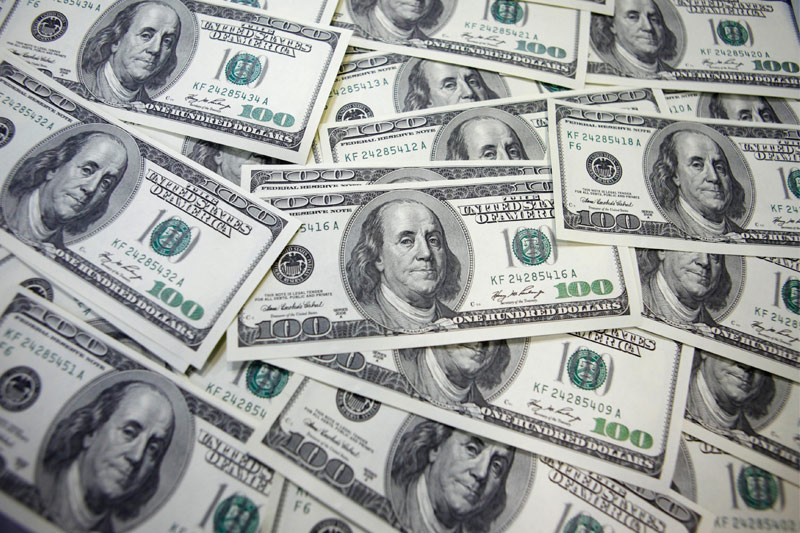Investing.com - The U.S. dollar was broadly higher against its major counterparts on Wednesday, as euro zone debt concerns persisted after weekend elections in Greece and France sparked fears that austerity measures may be abandoned.
During European morning trade, the dollar was higher against the euro, with EUR/USD falling 0.16% to hit 1.2985.
Concerns over Greece’s future in the single currency bloc mounted on Tuesday after Alexis Tsipras, the head of Greece’s second-biggest party Syriza, declared that Greece's financial aid package is null and void, and called for a moratorium on Greek debt payments.
Tsipras was to hold talks with Greece’s leading political parties later in the day, as attempt to form a government continue, but if talks fail a second round of elections will have to be held.
Investors were also fearful that French president-elect Francois Hollande’s focus on growth rather than austerity measures as a means to tackle the euro zone’s debt crisis could spark tensions with Germany.
Also Wednesday, official data showed that German exports and imports both hit record highs in March, fuelling hopes that the euro zone’s largest economy is weathering the effects of the debt crisis.
The Federal Statistics Office said exports increased by 0.9% to EUR91.8 billion, while imports rose 1.2% to EUR78.1 billion.
The greenback was higher against the pound, with GBP/USD declining 0.09% to hit 1.6143.
Industry data showed earlier that retail sales in the U.K. fell 3.3% in April after a 1.3% rise the previous month.
Elsewhere, the greenback was lower against the yen but higher against the Swiss franc, with USD/JPY falling 0.16% to hit 79.74 and USD/CHF adding 0.16% to hit 0.9250.
The greenback was higher against its Canadian, Australian and New Zealand counterparts, with USD/CAD rising 0.28% to hit 1.0015, AUD/USD dropping 0.47% to hit 1.0071 and NZD/USD retreating 0.28% to hit 0.7856.
Earlier in the day, Australia’s Prime Minister Julia Gillard said that the government will cut spending for the first time in 42 years, ending four years of budget deficits and giving the central bank flexibility to lower interest rates.
The comments came after official data showed on Tuesday that Australia’s trade deficit more than doubled in March, as commodity exports declined for a third successive month.
The dollar index, which tracks the performance of the greenback versus a basket of six other major currencies, was up 0.15%, at 80.06.
Later in the day, the U.S. was to produce government data on crude oil stockpiles. A 10-year U.S. government bond auction was also scheduled.
During European morning trade, the dollar was higher against the euro, with EUR/USD falling 0.16% to hit 1.2985.
Concerns over Greece’s future in the single currency bloc mounted on Tuesday after Alexis Tsipras, the head of Greece’s second-biggest party Syriza, declared that Greece's financial aid package is null and void, and called for a moratorium on Greek debt payments.
Tsipras was to hold talks with Greece’s leading political parties later in the day, as attempt to form a government continue, but if talks fail a second round of elections will have to be held.
Investors were also fearful that French president-elect Francois Hollande’s focus on growth rather than austerity measures as a means to tackle the euro zone’s debt crisis could spark tensions with Germany.
Also Wednesday, official data showed that German exports and imports both hit record highs in March, fuelling hopes that the euro zone’s largest economy is weathering the effects of the debt crisis.
The Federal Statistics Office said exports increased by 0.9% to EUR91.8 billion, while imports rose 1.2% to EUR78.1 billion.
The greenback was higher against the pound, with GBP/USD declining 0.09% to hit 1.6143.
Industry data showed earlier that retail sales in the U.K. fell 3.3% in April after a 1.3% rise the previous month.
Elsewhere, the greenback was lower against the yen but higher against the Swiss franc, with USD/JPY falling 0.16% to hit 79.74 and USD/CHF adding 0.16% to hit 0.9250.
The greenback was higher against its Canadian, Australian and New Zealand counterparts, with USD/CAD rising 0.28% to hit 1.0015, AUD/USD dropping 0.47% to hit 1.0071 and NZD/USD retreating 0.28% to hit 0.7856.
Earlier in the day, Australia’s Prime Minister Julia Gillard said that the government will cut spending for the first time in 42 years, ending four years of budget deficits and giving the central bank flexibility to lower interest rates.
The comments came after official data showed on Tuesday that Australia’s trade deficit more than doubled in March, as commodity exports declined for a third successive month.
The dollar index, which tracks the performance of the greenback versus a basket of six other major currencies, was up 0.15%, at 80.06.
Later in the day, the U.S. was to produce government data on crude oil stockpiles. A 10-year U.S. government bond auction was also scheduled.
